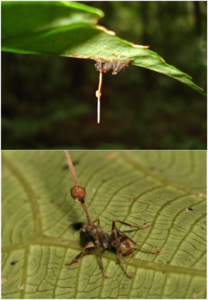A Most Efficient Parasite
It begins with cells from the atmosphere taking up residence in the host's blood stream. These cells begin to proliferate and develop tubal extensions that connect aggregates of cells. Feeding off the host's blood is then transmitted through these tubes to develop a networking of these aggregates. They begin to infiltrate the host's muscle and this releases chemicals which infiltrate the host's brain. This causes the host to leave its home colony, to travel up a nearby plant stem and at precisely 25 centimeters, the host stops, takes the plant's main vein into its mandible, clenches tightly so that the plant's juices begin to flow. This grip on the plant vein becomes permanent and the ant host is now unmoving. Inside the ant, the parasite begins to form a kind of spear that goes through the ant's head. A bulbous head develops on this spear and eventually bursts, pouring a large number of cellular spores onto the ant colony and its trails below. This ensures the infection of many more hosts.
This parasite is known as Ophiocordyceps unilateralis. The etymology refers to "club headed snake." It is commonly known as the "Zombie" parasite, as it is completely takes over any independent function of the ant. It is a form of parasitic fungus and has been known to completely destroy ant colonies.
In a previous post on parasites (see October 4), I mentioned the use of biological realities as a form of "analogical" research in exploring the psychological and cyberlogical relevance of these biological "models." I will explore this relevance in a subsequent post. In the meantime…think about it.
My thanks to The Atlantic’s Ed Young for his fascinatiung piece entitled, ” How the Zombie Fungus Takes Over Ants’ Bodies to Control Their Minds.” (The Atlantic, November 14, 2017). The illustration here is from Wikipedia.
Russ,
I’m amazed at the degree of inventive intelligence the spores manifest. The invasive process you describe bears witness to a kind of wicked, merciless genius inherent in the biosphere—probably the entire universe—where parasitism in general can be seen as an aspect of evolution. Viruses, for example, have been recently credited as fundamental to the evolutionary process on earth. Bacteria may hitch rides on comets or embed themselves in the hearts of meteors, before they plunge to earth as seeded-meteorites.
In all its bizarreness, life seems to recruit whatever will serve its mysterious ends. And, in keeping with the paradoxical nature of nature, who is to say where “the creative” ends and “the destructive” begins—or vice-versa?
The very thought that your example of Ophiocordyceps lateralis spore-to-ant parasitism might actually serve as a “model” or mirror for human psychological and cyber-logical situations, as you hint, is certainly chilling.
Then again, there seem to be hurricane-strength clouds composed of “bits of information,” swirling around us like those spores that descend on the poor ant colonies. Able to—designed to—envelop and penetrate us, the unwitting human hosts, each “cyber-logical spore,” let’s call it, is outfitted with its own demonic means of access to our vital functions and energies—our thoughts, desires and wills—which it algorithmically (and other ways?) taps into for the purpose of its own propagation. Thus, we humans come more and more to resemble “zombies,” the living dead, like the host ants for those ingenious “Ophiocordyceps lateralis” fungi.
(QUESTION: Is this one reason why “zombie movies” have become so popular?)
Which is more horrific? To give ourselves over voluntarily to the parasites—“voting the spore ticket,” so to speak— or to be turned by the spores into their personal hosts and slaves without our knowing it, without being able to stop it?
There may be cold comfort in the Spanish proverb: “Mejor mal conocido, que major por conocer.” Better the devil that you know, than the devil you don’t.
In either case, it seems increasingly clear that—with or without our knowledge—the spore-devil invasion is gaining on us. We are surrounded, our defenses long-since compromised and penetrated. After all, what’s the difference between a computer-virus—one modern plague—and a computer-spore?
Finally, I wonder whether the reality of this spore-and-host process may be contributing to the acceleration of a planetary, ecological, climate collapse. The more humans that are captured to serve as zombie-hosts, the faster the larger climate-crisis will most likely progress. We don’t yet know whether actual, biological spores, viruses and bacteria will outlive this current extinction process we’re in, even if it should result in our own (human) demise. The “microbial realm” certainly survived the past five Great Extinctions. Their survival this time around might depend on how far the multiplication of runaway feedback loops in nature finally goes, in the long run.
Take Venus, please!—(thank you, Rodney Dangerfield!)—as one example, or parallel, or metaphor. My guess is that neither biological spores nor their hosts remain on the surface of Venus, a planet that may be reflecting back to us, from its four-billion-year-old past of biological collapse, as well as an image of one of Earth’s and therefore our possible futures—if we fail to come to terms with the reality of runaway feedback loops, “in time.”
One would think that surface temperatures approaching 900 degrees F.—enough to melt lead!—would constitute not only a formidable barrier to any planetary life, but also a stern spur to action, or at least attention, reflection and preparation!
At the same time, the Venusian atmosphere raises an intriguing question for our spore/parasite-and-ant/host conundrum. Consisting mostly of CO2, with intense pressures equivalent to a 3000-ft. ocean-depth, and constant, violent, super-rotating winds (over 200 mph), the Venusian atmosphere supports clouds of sulphuric acid in a dense, turbulent soup that might tell a different story about the long-term effects of self-amplifying feedback loops. A dead surface, but a living, though demonic, atmosphere? We don’t know. But . . .
Who knows what the esoteric genius of cosmic life could cook up in those kinds of clouds?